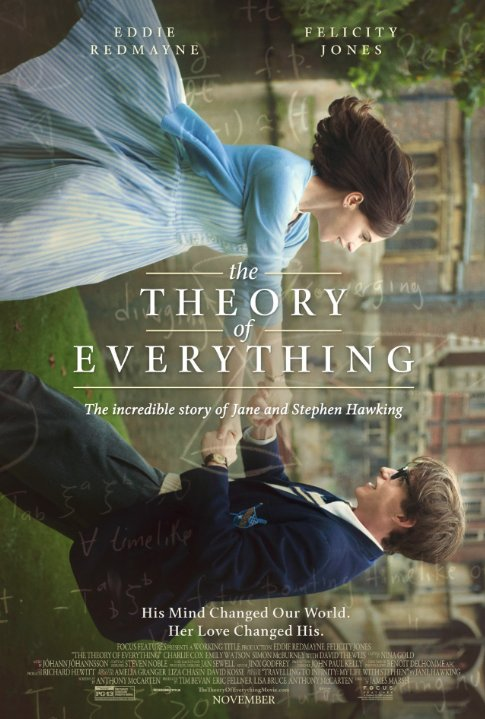film review: the theory of everything
Charting the life of Dr. Stephen Hawking and his wife Jane from their blissful relationship beginning in the 60s and to its end in the mid 90s, The Theory of Everything attempts to provide a private look into the life of one of the world’s most fascinating minds.
It begins with Hawking (Eddie Redmayne) as a Physics student at Cambridge University attempting complete PhD; lively, mischievous and charming, he catches the eye of fellow student Jane Wilde (Felicity Jones) and the two begin their fairytale romance. Just as they start to see a future together, Stephen is diagnosed with motor-neuron disease, and is given only two years to live. Stephen and Jane must face the fact that their love has to endure through Stephen’s life shattering diagnosis.
The Theory of Everything is a perfectly adequate biopic about one of the world’s most incredible minds, but it isn’t much more than that: adequate. For die-hard Hawking fans it will be an intriguing insight into the private life of a very brave and brilliant man. The film’s first half sets up the struggle Jane and Stephen must face if they are to overcome this dreadful obstacle together, and it is at times very moving and touching.
But much like studying physics, the film’s second half becomes dull and devoid of any intrigue past the couple’s struggle with the initial stages of Hawking’s condition. The plot becomes so overdramatised and convoluted that you start to wonder where the real truth is here. The screenplay by Anthony McCarten was based on Jane Hawking’s autobiography Travelling to Infinity, so of course, we are asked to believe that what we are watching is the truth of how their relationship developed over the years. Yet one has to wonder if the film could’ve been improved by examining Hawking’s life from outside the domestic sphere. Although this is Jane’s version of the story, she is never really given a chance to express her own feelings and aspirations away from pleasing the men in her life. Whether its looking after Stephen or her affair with the church choirmaster, this is her story told through her life with men. I ended the movie simply wanting to know more about Jane and her own life.
The direction from James Marsh (of Man on Wire fame) is nothing more than safe. It’s essentially the act of taking Jane Hawking’s words and placing them onto the screen; it’s not imaginative or daring in any sense, conversely it’s fairly dull and uninspired. Although The Theory of Everything is essentially about two ordinary people facing extraordinary circumstances, it feels like a restrained effort on Marsh’s behalf to depict the Hawkings not only as a normal family but also as a rather dull one.
Biopics tend to place their subject matter upon a pedestal. The sappy heroism put upon Hawking is sickly sweet, and to be honest, a little disrespectful to assume that he has no faults (he’s a human being, after all). That’s not to say that there aren’t some beautiful or heartbreaking moments within the film, but most are dealt with too a heavy hand to fully realise their potential. The film looks beautiful with a sepia drenched hue over the screen signifying the years passing, and features a lovely score from Jóhann Jóhannsson, but more is needed than just pretty pictures and pretty music to make a film outstanding.
Redmayne is aided by a cast of strong supporting actors, especially Felicity Jones. Jones’ performance is subtle, her character struggling with a difficult life choice: should she stay with Stephen and look after him, or should she leave him and live her own life? But even though the film is essentially told from her point of view and adapted from Jane Hawking’s own autobiography, we never really get to know who she is as an individual, only who she is in relation to Stephen’s story.
Biopics about famous people who have faced trauma in their lives are often prime objects of Oscar bait, and The Theory of Everything is definitely a prime example of a mediocre film with a great lead performance, tricking the Academy into thinking it’s “Oscar worthy”. Although Redmayne’s performance is indeed extraordinary—he twisted and contorted his body, voice and face to replicate Hawking’s own mannerisms,—it just wasn’t fresh or unique. It was something that had already been done in films like Rain Man, Shine, My Left Foot and Forrest Gump, which made me ask the question: what is it that makes us get so excited over white, able-bodied male actors playing disabled geniuses? Hollywood seems to relish in making films about disability, but ignores the fact that they never hire disabled actors, and The Theory of Everything is just adding fuel to the fire of inequality in the film industry.
Although the film has moments of beauty, levity, and provides a generally moving story about one of the world’s most celebrated minds, The Theory of Everything leaves you wanting less melodrama and more substance.


